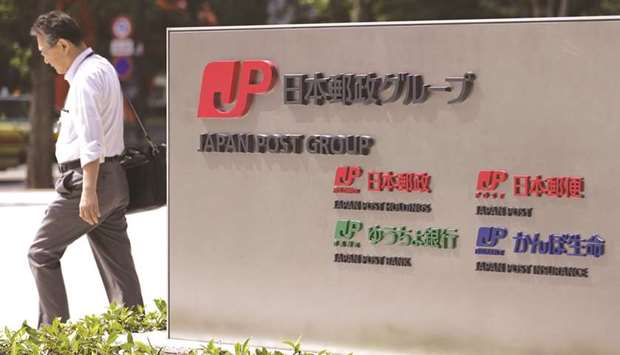Japan Post Bank Co is shifting more of its investments in risky US corporate debt away from investment funds and into vehicles that offer a cushion against losses in a downturn, according to a person with knowledge of the matter.
The postal bank will increase its investment in collateralised loan obligations, or CLOs, which bundle together US loans made to highly leveraged companies, said the person, who asked not to be identified discussing a private matter.
It would, in turn, pare its allocation to funds that buy the debt.
The strategy shift comes amid growing concern over the risks piling up in the $1.3tn US leveraged loan market, which is made up of companies typically rated below investment-grade and more vulnerable to defaults when economic growth slows.
The higher-rated CLO pieces purchased by Japan Post and other institutions in the Asian country are first to be repaid when defaults increase, meaning lower-ranked slices of CLOs take losses first.
CLOs are also seen as having more stable funding because they issue debt that typically matures later than the loans they buy.
And regulators have warned that they could struggle in a downturn because leveraged loans are less liquid than other types of debt.
While the move reflects rising public concerns over the health of US leveraged loans, the bank believes the risks are contained, according to the person with knowledge of the bank’s strategy.
Japan Post Bank has about ¥6tn ($55bn) of funds that invest in US corporate loans, the person said.
It held ¥1.3tn of CLOs in June, company filings show.
Japan Post Bank is one of the nation’s largest institutional investors with a $1.9tn portfolio, of which 30% is in foreign securities.
A spokesman for the bank declined to comment.
Policy makers including Federal Reserve Chairman Jerome Powell are paying close attention to the buildup of leveraged loans, most of which are packaged into CLOs, and the risks that they may pose to the financial system should the global economy falter.
Japan Post Bank, which has about $1.7tn in deposits, is under greater pressure than most of its peers to generate returns because it is largely restricted from lending directly.
It has slashed its Japanese government bond holdings by 58% and almost quadrupled investment in foreign debt in the past six years.
Shares of Japan Post Bank rose 0.3% on Wednesday morning in Tokyo, paring this year’s decline to 13%. Another major Japanese investor is also making tweaks to its overseas strategy.
The Government Pension Investment Fund, the world’s biggest retirement fund, said on Tuesday it will consider treating currency-hedged foreign bonds as part of its domestic debt portfolio, giving it room to buy more overseas debt.
CLOs are made up of tranches that each have a different risk and return.
Japanese investors such as Japan Post and Norinchukin Bank have been snapping up the most senior slices, which rank first for payments.
Mutual funds are also major buyers of corporate loans that are often below investment grade.
Investors are allowed to redeem their shares daily, creating a potential mismatch because the underlying loans take longer to sell, Powell said in a speech in May.
Widespread redemptions “could lead to widespread price pressures, which could affect all holders of loans, including CLOs and those that hold CLOs,” Powell said.
He urged financial firms and global regulators to understand the risks tied to CLOs and leveraged loans.
Japanese regulators have stepped up scrutiny of financial firms’ investments in CLOs.
The Bank of Japan and Financial Services Agency recently surveyed banks and insurers to determine their exposure to such assets, Bloomberg reported last month.

A pedestrian walks past signage for Japan Post Group in Tokyo.
